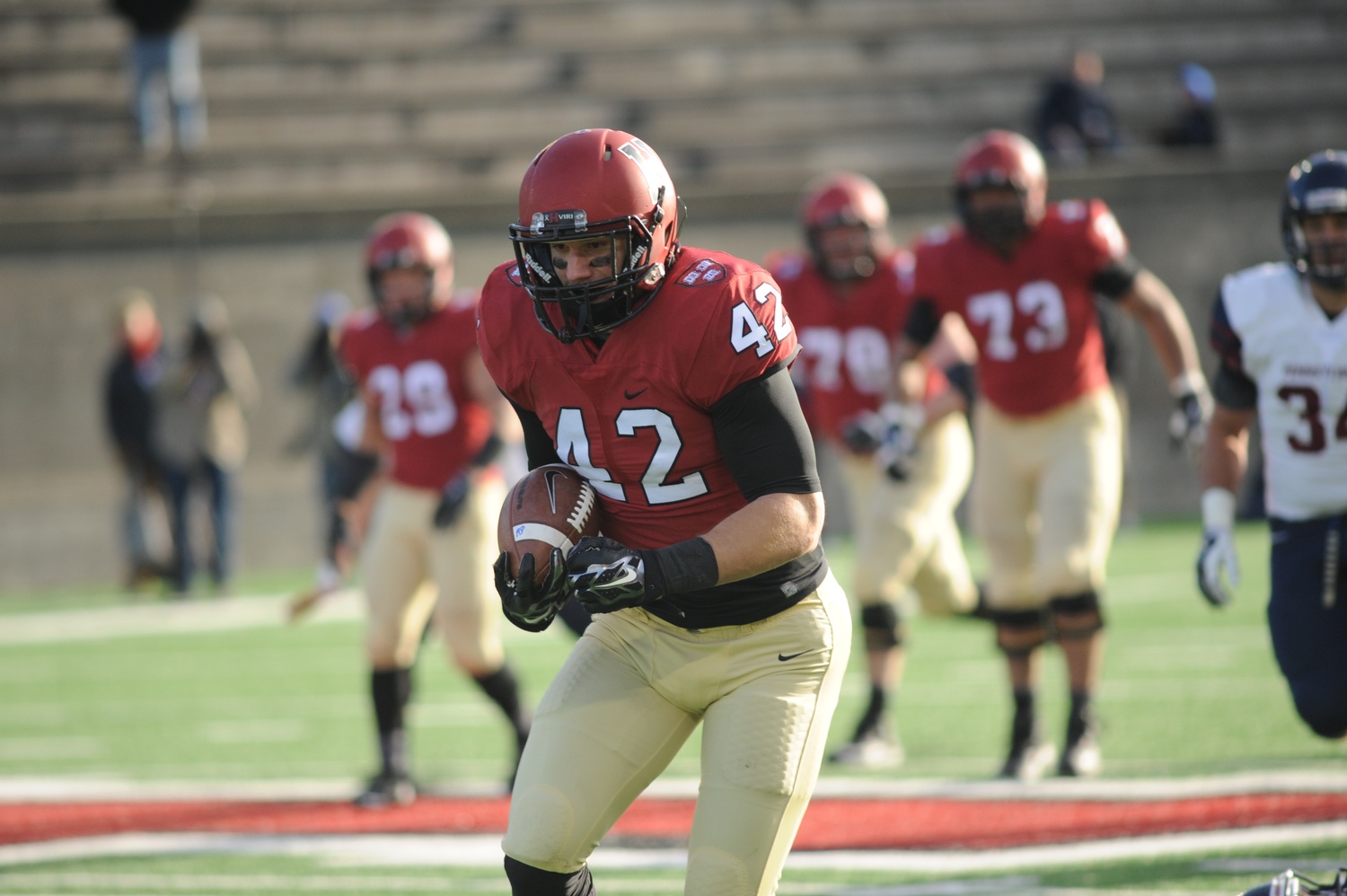
News
Summers Will Not Finish Semester of Teaching as Harvard Investigates Epstein Ties

News
Harvard College Students Report Favoring Divestment from Israel in HUA Survey

News
‘He Should Resign’: Harvard Undergrads Take Hard Line Against Summers Over Epstein Scandal

News
Harvard To Launch New Investigation Into Epstein’s Ties to Summers, Other University Affiliates

News
Harvard Students To Vote on Divestment From Israel in Inaugural HUA Election Survey
NOTEBOOK: Just the Way the Wind Blows for Harvard Football

Forget the 22-game win streak and the prospect of a 2015 Ivy League title. Heading into Saturday’s matchup against Penn at Harvard Stadium, the Crimson had a chance to achieve something even more historic: taking sole ownership of the all-time lead in Ancient Eight titles.
Before this season, both teams boasted 16 conference championships; had Harvard won this weekend, the hosts would have secured a record 17th crown.
Instead, the dark-horse Quakers (6-3, 5-1 Ivy), a team picked to finish sixth in preseason polls, took control early and held on late, fighting to a 35-25 win. The result denied the Crimson (8-1, 5-1) an outright title and rejiggered the Ivy League into a three-way tie for first, with Penn, Harvard, and Dartmouth all sporting one loss.
WIND AT THEIR BACKS
At noontime kickoff, weather readings recorded wind gusts that consistently reached 24 miles per hour.
On the field and in the stands, that number may have felt conservative. Metal goalposts buckled and bent, and scarves rippled. When the Quakers lined up for opening kickoff, a Penn player had to hold the ball in place.
Those conditions hardly changed in the first two quarters. Moreover the wind blew vertically, from one end zone to the other, which put one offense at a clear advantage.
In the first quarter, Quakers senior quarterback Alek Torgersen threw with the wind and completed seven of 10 passes for 158 yards. Meanwhile Crimson senior quarterback Scott Hosch went five of eight for 40 yards.
By contrast, in the second period, Torgersen totaled a mere 13 yards on four completions, while Hosch racked up 86 yards on five completions.
“You just go out and try to make the right reads,” Hosch said. “There were a couple throws that the wind pushed a little but, but [that’s] definitely not an excuse for anything.”
Even so, the scoreboard demonstrated the power of the wind. Although Penn ended the first 15 minutes with a 21-6 lead, Harvard put up 19 unanswered points in the second quarter to head into halftime with a 25-21 advantage.
Perhaps the greatest sign of the windiness was the struggles of Crimson punter Zach Schmid.
During the first period, Schmid kicked into the full fury of the wind and wound up with a pair of 21-yard punts. Some of the squall had calmed down by the third quarter, but Schmid still had to contend with the elements, as evidenced by a 13-yard kick on his first try after halftime.
FOURTH-AND-NONE
Few games actually hinge on a single play, but significantly more games seem as if they do—as if an individual snap can irrevocably swing momentum.
At the time, and in retrospect, the fourth-and-one that Harvard faced at the end of the third quarter felt this way.
To set the scene: the Quakers held a 28-25 lead, and the Crimson had the ball at Penn’s 10-yard line.
A play before, an eight-yard scramble by Hosch had forced Harvard coach Tim Murphy into a difficult choice: to attempt a field goal with sophomore kicker Kenny Smart, who had already missed an extra point, or to try to pick up a first down behind an offensive line that was without senior Anthony Fabiano, a three-year starter. Less than a minute remained in the quarter, and regardless of what Murphy chose, Harvard would start the fourth quarter with the breeze at its back.
“The bottom line is, we feel like we’re going to get the wind,” Murphy said. “We feel like our defense is playing well, and we’re going to be able to be in a one-score game.”
Ultimately Murphy’s decision was the more conservative one—to tie the game now with three points rather than risk a turnover on downs.
Except in this case, the reality didn’t work so smoothly. Penn freshman defensive back Jyron Walker broke through the line to block the kick, the Quakers recovered at the 20, and four plays later, wide receiver Justin Watson broke free for a 79-yard touchdown.
This whiplash change in fortunes gave Penn a two-possession lead at 35-25; the score would remain unchanged the rest of the way.
JUSTIN WATSON
In the Crimson’s previous eight games, exactly three players had topped 100 yards receiving, and none had reached 100 yards rushing.
On Saturday, Penn wide receiver Justin Watson achieved both feats.
By the end of the first quarter, the sophomore had already eclipsed 100 yards through the air, largely thanks to a 68-yard touchdown. That score came on a third-and-four with less than four minutes remaining, when Watson split the middle of the Harvard defense on a slant route.
Watson then reached a triple-digit rushing total at the start of the fourth quarter.
Earlier in the possession, a false start call on Watson, followed by a sack of Torgersen, had pushed the Quakers back for a second-and-21.
On the next play, though, Watson erased this yardage—and much more. As a squadron of blockers pushed Crimson defenders out of the way, he took a sweep handoff and made for the right sideline. Without anyone touching him, he turned the corner and accelerated the rest of the way for the score.
“It was really just get to the outside and run straight up,” Watson said. “[Senior wide receiver Cameron Countryman] pushed a guy all the way out to the sideline…. It’s all those guys.”
Want to keep up with breaking news? Subscribe to our email newsletter.
